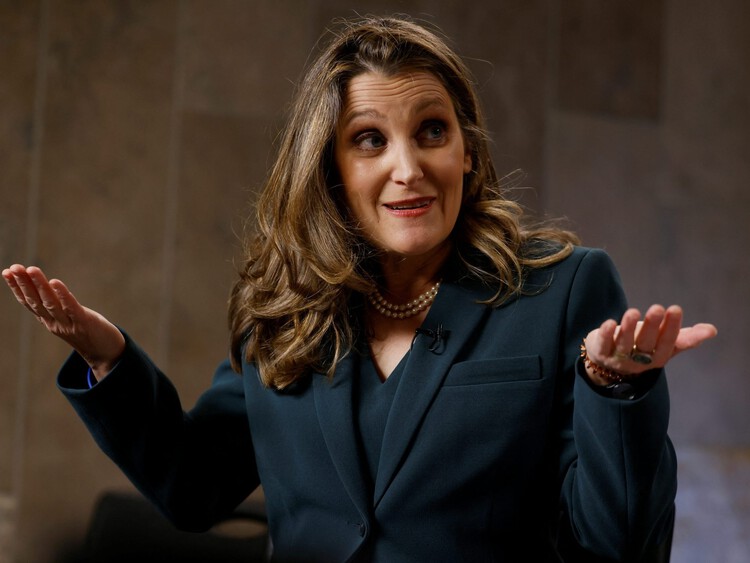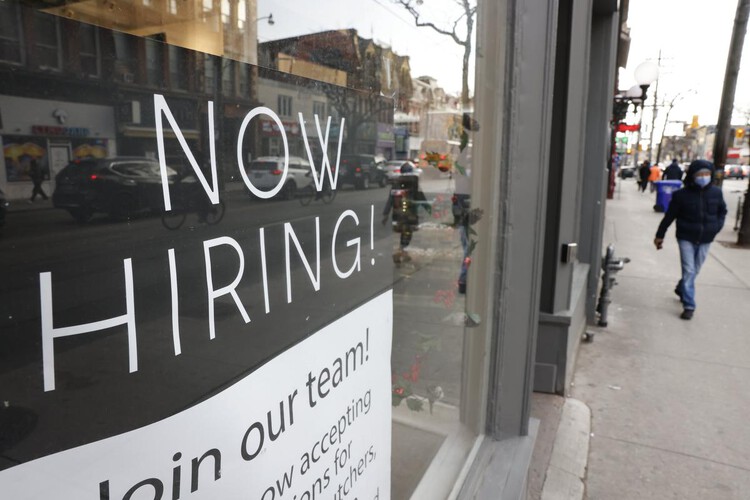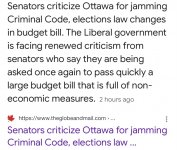But the minimum wage is about to increase, at least in BC.Green Jobs are that $15.88 on the bottom.
Well, today is the Liberal/NDP Non-Coalition Coalition Budget Day!
- Thread starter Ron in Regina
- Start date
You are using an out of date browser. It may not display this or other websites correctly.
You should upgrade or use an alternative browser.
You should upgrade or use an alternative browser.
Thats a national average.But the minimum wage is about to increase, at least in BC.
The country's main federal-employee union will wrap up voting in April on whether to go ahead with a national strike that could see as many as 165,000 workers withdraw their services. Such a work stoppage would delay tax return processing as well as interrupt service at airports and border crossings.
The looming strike comes amid a slowdown in inflation in recent months, but workers are unbending in their demands to recoup purchasing power lost over the past two years. That's adding additional wage pressures to an already overheated job market, and squeezing employers ahead of an expected economic downturn this year.
“Workers are completely frustrated of being left behind. We've got to fight back if we want to achieve a fair and decent wage increase,” Chris Aylward, president of Public Service Alliance of Canada, said in a phone interview. “Early indication is that the frustration is going to project into a strong strike mandate.”
This will be interesting when most of them are already working from home. Curious where the picket line gets set up. Heaven help them if they have to commute.
I always enjoyed the logic that if government employees were working in private industry they would get the same remuneration and benefits.
The looming strike comes amid a slowdown in inflation in recent months, but workers are unbending in their demands to recoup purchasing power lost over the past two years. That's adding additional wage pressures to an already overheated job market, and squeezing employers ahead of an expected economic downturn this year.
“Workers are completely frustrated of being left behind. We've got to fight back if we want to achieve a fair and decent wage increase,” Chris Aylward, president of Public Service Alliance of Canada, said in a phone interview. “Early indication is that the frustration is going to project into a strong strike mandate.”
This will be interesting when most of them are already working from home. Curious where the picket line gets set up. Heaven help them if they have to commute.
I always enjoyed the logic that if government employees were working in private industry they would get the same remuneration and benefits.
Yup, there's gold in them there government employment and by god we're gonna get our share - screw the people we're supposed to be working for cuz they're "special."
I would think that working from home is and of itself a "raise" of sorts since they don't have to travel to work whether by vehicle or by public transit so they save money there. But hey, it's still not enough! Greedy buggers!!
I would think that working from home is and of itself a "raise" of sorts since they don't have to travel to work whether by vehicle or by public transit so they save money there. But hey, it's still not enough! Greedy buggers!!
No they want to recoup the money saved by working from home once having to go back to office .Yup, there's gold in them there government employment and by god we're gonna get our share - screw the people we're supposed to be working for cuz they're "special."
I would think that working from home is and of itself a "raise" of sorts since they don't have to travel to work whether by vehicle or by public transit so they save money there. But hey, it's still not enough! Greedy buggers!!
The real bonus of working from home is writing off the office portion of the mortgage.Yup, there's gold in them there government employment and by god we're gonna get our share - screw the people we're supposed to be working for cuz they're "special."
I would think that working from home is and of itself a "raise" of sorts since they don't have to travel to work whether by vehicle or by public transit so they save money there. But hey, it's still not enough! Greedy buggers!!
Government employees working from home save on transportation , clothing and cleaning , lattes and lunches obviously we must subsidize them to return to the office . If they can also get a tax deduction of course we can afford it .The real bonus of working from home is writing off the office portion of the mortgage.
They can only claim the a portion of the interest on the mortgage, not the mortgage itself so the claim isn't a big a deal as it sounds.The real bonus of working from home is writing off the office portion of the mortgage.
GOLDSTEIN: Finance Minister Chrystia Freeland's politics of the absurd — Toronto Sun
It was the $43.9-billion question Finance Minister Chrystia Freeland refused to answer. During her testimony before the Commons finance committee Tuesday about the federal budget that she tabled in Parliament on March 28, Freeland was asked a simple question by Conservative MP Adam Chambers. It...
During her testimony before the Commons finance committee Tuesday about the federal budget that she tabled in Parliament on March 28, Freeland was asked a simple question by Conservative MP Adam Chambers.
It was the amount of interest taxpayers will pay in the 2023 fiscal year (April 1, 2023 to March 31, 2024) on Canada’s $1.22 trillion public debt.
It wasn’t a trick question. The numbers are in Freeland’s budget.
Interest on the federal debt will cost Canadians an estimated $43.9 billion in 2023 on $1.22 trillion of public debt; $46 billion in 2024; $46.6 billion in 2025; $48.3 billion in 2026 and $50.3 billion in 2027, when the total federal debt will be $1.31 trillion.
Instead of answering the question, Freeland accused Chambers of “fiscal fear-mongering” — in the tone of voice she frequently adopts that sounds like she thinks she’s lecturing a wayward child.
Here’s how the exchange went:
Providing context without stating the number is arrogant and suggests Freeland, for some reason, thought saying it out loud, even in context, would be politically damaging.
Freeland also accused Conservatives MPs of trying to “bully” her by launching a two-week filibuster before her appearance because they wanted her to testify for two hours instead of one — which ended up being 80 minutes of testimony.
Then again, we shouldn’t be surprised.
After all, Prime Minister Justin Trudeau doesn’t answer the questions he’s asked all the time — whether from opposition MPs in question period or by reporters in media scrums.
So it’s hardly surprising Freeland does the same. There’s a transcript of some of the greasily evasive non-answers at the link at the top of this post.
How many more Ukrainian war widows and their kids do we need to cover the interest?Interest on the federal debt will cost Canadians an estimated $43.9 billion in 2023 on $1.22 trillion of public debt; $46 billion in 2024; $46.6 billion in 2025; $48.3 billion in 2026 and $50.3 billion in 2027, when the total federal debt will be $1.31 trillion.
Let Freeland answer that one in a clear and concise “I want to be very very clear…” statement that she & Justin are both becoming famous for.
It's OK. Cut taxes, increase spending, and the Magic of Growth will fix everything!
If anyone is a bully, it's her. Look what she did to the banking services of Convoy supporters. She is claiming that others are what she is & does.It was the $43.9-billion question Finance Minister Chrystia Freeland refused to answer.
GOLDSTEIN: Finance Minister Chrystia Freeland's politics of the absurd — Toronto Sun
It was the $43.9-billion question Finance Minister Chrystia Freeland refused to answer. During her testimony before the Commons finance committee Tuesday about the federal budget that she tabled in Parliament on March 28, Freeland was asked a simple question by Conservative MP Adam Chambers. It...apple.news
During her testimony before the Commons finance committee Tuesday about the federal budget that she tabled in Parliament on March 28, Freeland was asked a simple question by Conservative MP Adam Chambers.
It was the amount of interest taxpayers will pay in the 2023 fiscal year (April 1, 2023 to March 31, 2024) on Canada’s $1.22 trillion public debt.
It wasn’t a trick question. The numbers are in Freeland’s budget.
Interest on the federal debt will cost Canadians an estimated $43.9 billion in 2023 on $1.22 trillion of public debt; $46 billion in 2024; $46.6 billion in 2025; $48.3 billion in 2026 and $50.3 billion in 2027, when the total federal debt will be $1.31 trillion.
Instead of answering the question, Freeland accused Chambers of “fiscal fear-mongering” — in the tone of voice she frequently adopts that sounds like she thinks she’s lecturing a wayward child.
Here’s how the exchange went:
Freeland’s argument was, of course, logically flawed in that if you want to provide context to a number, you have to say what the number is.
Providing context without stating the number is arrogant and suggests Freeland, for some reason, thought saying it out loud, even in context, would be politically damaging.
Freeland also accused Conservatives MPs of trying to “bully” her by launching a two-week filibuster before her appearance because they wanted her to testify for two hours instead of one — which ended up being 80 minutes of testimony.
Then again, we shouldn’t be surprised.
After all, Prime Minister Justin Trudeau doesn’t answer the questions he’s asked all the time — whether from opposition MPs in question period or by reporters in media scrums.
So it’s hardly surprising Freeland does the same. There’s a transcript of some of the greasily evasive non-answers at the link at the top of this post.
Cut taxes. Cut spending. Live within your means.It's OK. Cut taxes, increase spending, and the Magic of Growth will fix everything!
Omnibus bullshit.…& here we are again.
I do not have a subscription to the Globe&Mail, nor do I have a subscription to Disney+….
View attachment 18461
I would be very interested in reading this article or others like it in the days to come when they reach the peasant access point of free media, which is the pool that I swim in.
Hey, what about that nearly $30 billion subsidy going to Stellantis and Volkswagen, compliments of Ford and Trudeau, to develop and manufacture electric batteries? We could have earned $30 billion from Germany and Japan, but as Mr. Trudeau, wizard entrepreneur, wisely warned us there was “no business case” for those deals. Our carbon taxes (plural) and the Liberal allergy to the resources we already have, ruled them out.
And after all, they would be bringing new money into Canada for proven technologies and boosted our economy. When has that crazy kind of business plan ever worked?
That kind of arrangement doesn’t have a ghost’s chance of standing up to Canada slapping extra billions and billions on an already swollen deficit, in a time of inflation and grocery prices chewing up the rent money, and bribing foreign companies with taxpayer funds on a purely speculative undertaking.
The Liberal government may be weak on many fronts. But on economics, it is stocked with a surplus of world-class thinkers.
And after all, they would be bringing new money into Canada for proven technologies and boosted our economy. When has that crazy kind of business plan ever worked?
That kind of arrangement doesn’t have a ghost’s chance of standing up to Canada slapping extra billions and billions on an already swollen deficit, in a time of inflation and grocery prices chewing up the rent money, and bribing foreign companies with taxpayer funds on a purely speculative undertaking.
The Liberal government may be weak on many fronts. But on economics, it is stocked with a surplus of world-class thinkers.
“We expect a 25-basis-point hike from the Bank of Canada this week,” said CIBC senior economist Andrew Grantham.
“What we’ve learned from the last rate hike is that (the central bank) would rather err on the side of doing too much to get inflation under control, knowing that they can cut interest rates next year, rather than doing too little in the near term.”
Forecasters say this will “likely” be the final hike of the cycle, “however” there is still a risk of additional hikes in the future if necessary to battle stubborn inflation. Another rate hike means additional financial burdens for indebted households and mortgage holders, who are being squeezed by rising interest rates, which are increasing the cost of servicing debt.

 apple.news
apple.news
“What we’ve learned from the last rate hike is that (the central bank) would rather err on the side of doing too much to get inflation under control, knowing that they can cut interest rates next year, rather than doing too little in the near term.”
Forecasters say this will “likely” be the final hike of the cycle, “however” there is still a risk of additional hikes in the future if necessary to battle stubborn inflation. Another rate hike means additional financial burdens for indebted households and mortgage holders, who are being squeezed by rising interest rates, which are increasing the cost of servicing debt.
‘It’s going to get more painful’: Bank of Canada widely expected to raise key interest rate Wednesday — Toronto Star
The Bank of Canada has repeatedly said the country’s hot labour market is contributing to high inflation, and while the labour market is showing some signs of softening, the economy still added a whopping 60,000 jobs in June.
They're gonna hike to 25 bases?“We expect a 25-basis-point hike from the Bank of Canada this week,” said CIBC senior economist Andrew Grantham.
I'll believe it when I see it. That's a hell of a hike.
